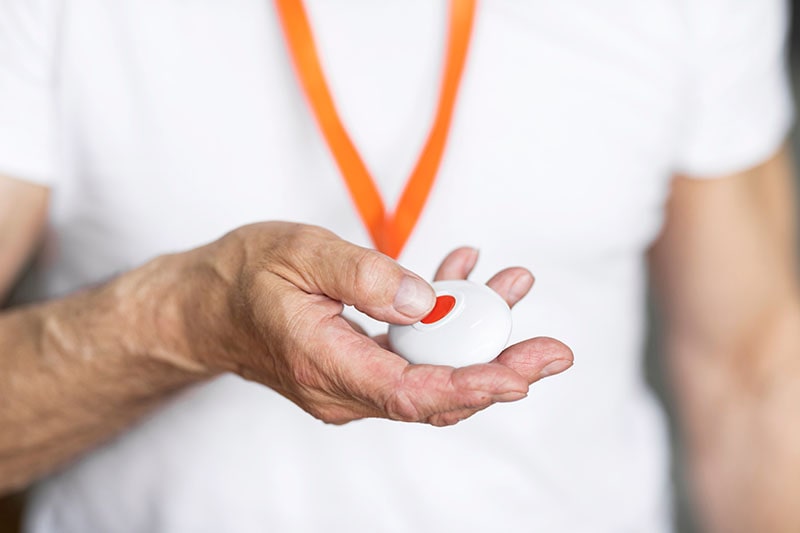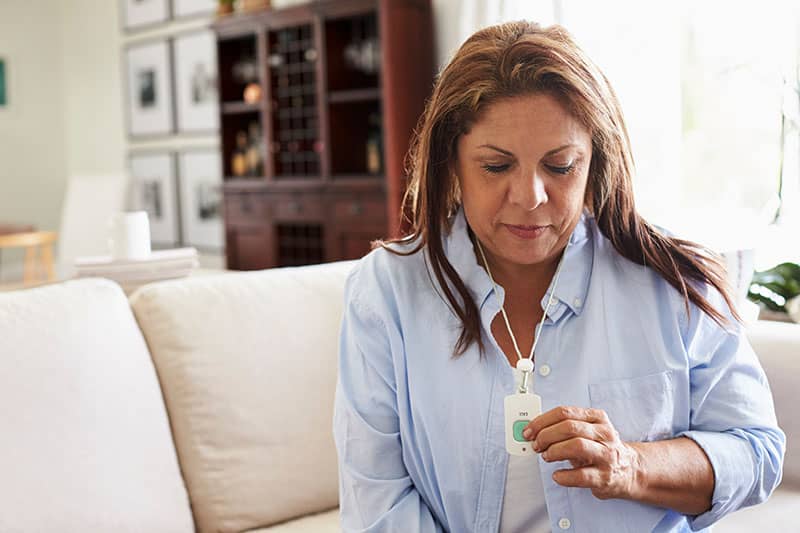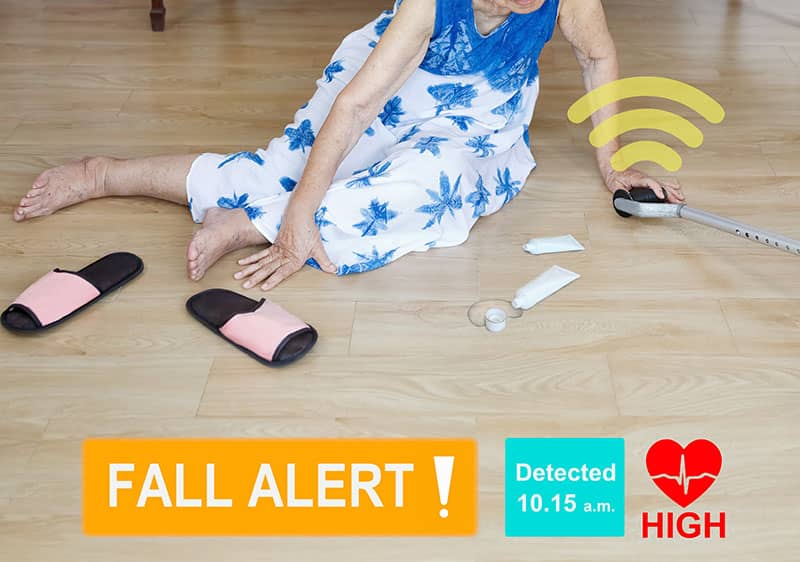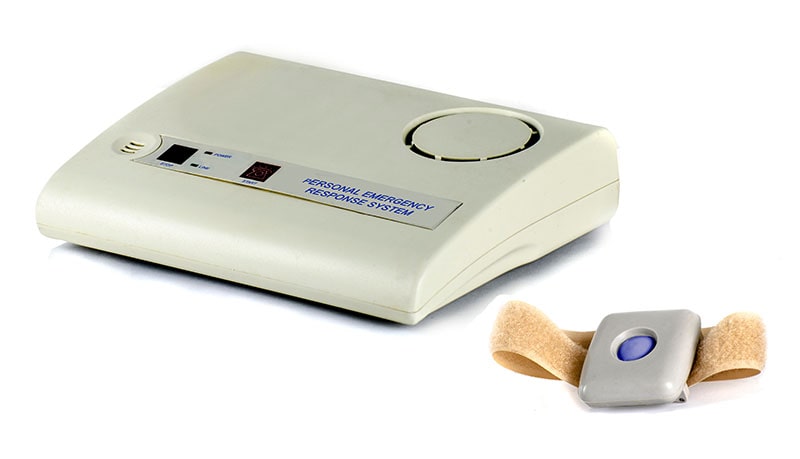
As we get older, change is inevitable. But one of the changes that many seniors in Quebec want to avoid is losing their independence.
Living independently can become a challenge because many seniors aged 65 and older worry about being alone in an emergency. For older adults with a history of falls, or suffering from diabetes, stroke, or other medical conditions, being alone can be scary.
Medical emergencies happen without warning. Thanks to innovative panic buttons and medical alert devices, seniors in Quebec can now live independently without fear. These senior safety devices provide quick and easy access to emergency services 24 hours, 7 days a week, at a minimal cost.
With the assurance that help is just a push of a button away, senior adults can enjoy an independent, active, or comfortable lifestyle feeling safe and confident.
How do panic buttons work to protect older adults?

Panic buttons are also called Personal Emergency Response Systems (PERS), or medical alert systems. Their goals are the same – to help vulnerable and at-risk adults, regardless of age, to connect to emergency services quickly, day or night.
These panic buttons are wearable devices – bracelets, watches, or pendants. They are lightweight and water-resistant or waterproof. Thus, they can be worn at all times, even to bed or while taking a bath.
This means that persons with disabilities don’t need to use a phone to call for help. With a panic button on your wrist or neck, just press the help button when you need help fast.
Most medical alert systems can be used when at home. Mobile systems can be used anywhere where there is a cellular signal.
When you are injured, fall, feel ill, need the police or fire department, or want to reach a family member for assistance, press the help button and an operator will be on the line to assist you quickly.
The response time is measured in SECONDS, not MINUTES. This ensures that in any critical emergency, a senior receives medical attention fast.
Note that every panic button has a built-in voice communication system so you can speak to an emergency operator without dialing a phone.
There is no faster or easier way to reach help than a panic button or medical alert system!
Important Features of a Medical Alert System

Each medical alert system can have different features that offer extra layers of security for older adults or at-risk individuals.
Users must wear their devices at all times to ensure that help is always within easy reach!
Compare the different features that can be found in medical alert systems so you can find the right one for your needs!
24/7 Monitoring Services
A panic button is only effective if someone is always ready to answer in an emergency.
Monitored panic buttons guarantee a fast response when a user presses the help button. Monitoring stations operate 24/7 including weekends and holidays. Unless you have a relative or caregiver who is focused on your needs 24/7, monitored medical alert systems are the most reliable tools for getting help whenever you need it.
Waterproof/Water-resistant
Emergency bracelets or pendants can be water-resistant or waterproof. It is important to check with the company so that you can feel confident to use your device in the bathroom or while doing tasks.
2-Way Voice communication System
A medical alert system must have 2-way voice communication to allow a user to speak to an emergency operator through the wearable device. After pressing the panic button, you will immediately hear a voice to verify what kind of help you need. This professional and reassuring voice will help to calm down the user after an accident. You will also get assurance that help is on the way.
Fall Detection
Fall detection is an optional feature for many medical alert systems. When your device has fall detection, it has built-in sensors called accelerometers that analyze data quickly if you fall. These sensors try to distinguish normal movements like sitting down or lying down from a fall. It will automatically trigger an alert signal to the monitoring center and an emergency operator will attempt to contact you for verification.
With a standard medical alert system, the user must press the help button to alert the monitoring center of an emergency. With a fall detector, an alert is sent even if the user fails to push the button after falling.
GPS Tracking
Mobile medical alert systems offer GPS tracking which can be useful for seniors with Alzheimer’s or dementia. Seniors can wander, get lost, and cause their loved ones to worry. With GPS technology, a senior can be located quickly so help can arrive sooner than later.
Medication Reminder or Dispenser
Seniors can forget to take their medications. For those with serious ailments, skipping medications can be dangerous.
Some medical alert systems offer medication reminders to ensure that a user takes his medications on time. Some systems can notify a caregiver if a user skips his meds.
Notification to Family Members
It is a relief for family members to know that if something happens to a parent or grandparent, they will be notified immediately. There are certain emergencies wherein urgent attention from a caregiver or relative is needed. In situations that medical or police assistance is not required but personal attention is, a family member on the user’s contact list will be notified.
For instance, if the senior needs help with filling up prescriptions or getting dressed, a family member will be contacted. The user can press the help button if help is needed in non-medical situations so that a caregiver will be notified by the monitoring center.
Services in Multi-Languages
Quebec has many ethnic communities. Professional monitoring centers offer multi-language services so that users can speak in the language they are most comfortable in.
Please note that not all medical alert system companies offer this feature. You should check when shopping for your monitored device.
Ask for FREE and NO OBLIGATION quotes from reliable security companies.
Fill out the form on this page to receive offers for top medical alert systems available in Quebec.
Why do seniors need a panic button?

Panic buttons were designed to protect people from harm and get help fast in emergency situations. They can instantly connect to a monitoring center so that help will arrive fast. In many cases, the speed of the emergency response is critical to saving lives.
For seniors who are more prone to medical emergencies, a panic button is a MUST. It is not guaranteed that someone will always be around to help if you fall, feel sick, or when an accident occurs. With a panic button or medical alert system, you can simply press the help button to call for emergency services.
A panic button is the easiest and fastest way to call for help compared to using a smartphone or a landline. They are wearable devices around the wrist or neck so that users can always access the panic button at all times.
With one press of the panic, you will hear a voice on the line ready to send HELP wherever you are.
Panic buttons are highly recommended for:
- Seniors living alone;
- Adults aged 65 and older;
- Older adults with medical conditions such as stroke, hypertension, diabetes, Parkinson’s disease, etc.;
- Seniors with mobility issues or problems with balance or gait;
- People living with a disability;
- Older adults recovering from an illness or injury;
- Seniors with dementia, Alzheimer’s, memory loss;
- Seniors taking medications with side effects;
- Seniors with a history of falls;
- Workers in isolated environments.
FEES AND COST OF PANIC BUTTONS

The fees for a panic button or personal emergency response system must be transparent and clear. Reputable companies don’t have any hidden fees. The cost of the system/device and the monthly monitoring service should be provided.
Seniors should not hesitate to call for help out of fear of incurring charges when they press the button. No matter how many times you use your help button, even for accidental or false alerts, users should not be charged extra fees.
Below we present the cost of a panic button or medical alert system so you can plan your purchase based on your budget.
Device/Equipment Cost
Medical alert system companies use different price plans. Some require a one-time equipment cost while others give the equipment free with monthly fees.
When shopping for your device, check if the equipment is an outright purchase or on lease.
Activation Fee
Some medical alert system companies charge a one-time activation fee when you purchase your device.
Installation Fee
You may be charged an installation fee. Some companies offer free self-installation.
Monitoring Fees
Monitored medical alert systems have monthly fees depending on the plan you choose. At-home systems (landline type) are the cheapest plans available. Cellular systems have higher monthly fees. On-the-Go systems or mobile systems are the most expensive.
Contracts/Cancellation of Services
You can choose from month-to-month plans that don’t require long-term contracts if you don’t want a long commitment. Some companies require a lock-in contract for 24 to 36 months for their monitoring service. It is best to check before you buy the device or sign up for the service.
Ask the company about cancellation fees or how much time is needed in advance for you to cancel your monitoring plan.
Extra button
Some companies allow a system to cover and monitor spouses or two people living in the same home. This is a great deal that can save you money while providing emergency support services to you and your spouse. You may have to pay for a second button.
Lockbox
Some companies offer a lockbox for a key to your home that will allow emergency responders to enter your home in an emergency. This option will cost you extra.
Fall Detection
Some medical alert systems can include fall detection technology. It is a very important feature as it sends an automatic alert to the monitoring center if the user falls. If a senior slips or falls, can’t move or get up, and is unable to press the panic button, an auto alert will be triggered by the fall detector. This ensures you won’t be on the floor for hours waiting for help to arrive.
All medical alert system providers in Quebec are worthy of consideration and each one has pros and cons. Read on and compare your choices with the comparison table below.
Best Panic Buttons: Compare and choose the right one for you!

Below are 5 of the best panic buttons in Quebec that aim to protect seniors and at-risk individuals. Find out what their pros and cons are so you can choose the one that suits your needs.
Bedford Medical Alert System
Pros/Cons
- This is a Canadian company based in Toronto. Its products and services are tailored to the needs of seniors.
- They offer 4 types of systems: Home Freedom (for home use), Home Freedom minis in pendant and bracelet models, Home Freedom with Auto Fall Detection, and the Go Anywhere plan with GPS services.
- They have Bedford Monitoring Centres located in Canada.
- Their systems have a 2-way voice communication system.
- Monitoring centres are multi-lingual.
- A long-term contract is not required.
- Their devices are not waterproof but are water-resistant.
- Modest pricing.
Red Dot Medical Alert Systems
Pros/Cons
- This is a medical alert system company that was established by experts in elderly care.
- It is a partner of Bruyere, a healthcare organization in Ottawa, that improves people’s quality of life, helps them return home, and stay home.
- It is also a Canadian-owned company and has bilingual monitoring centres across Canada.
- The company offers At-Home Personal Solution, On-The-Go, and GPS SmartSole.
- When you push the panic button, you will be connected instantly to bilingual Canadian care specialists.
- 24/7 monitoring services with ULC-certified operators
- Live 2-way voice system
- Water-resistant devices
- 30-day risk-free guarantee
- No contract required, no cancellation fee
- Free self-installation
- The At-home Plan costs $39.99 and the At-Home with Fall Detection costs $49.99 a month.
Telus Livingwell Companion
Pros/Cons
- Medical alert systems offered by the Telus Healthcare Division.
- Acquired part of Alarm Force in 2018 and Direct Alert in 2020 to expand its services
- Offers two plans – Companion Home and Companion Go with an option for auto fall detection.
- The help button has a range of 600 ft while its mobile service depends on cellular range.
- Multilingual monitoring support services – English, French, Punjab, Mandarin, and Cantonese
- 2-way voice communication system
- No landline required
- No contract
- Pendants are bigger than other panic buttons
- Water-resistant devices
- The device cannot be charged while the user is wearing it.
- Does not work with cable or VOIP.
Life Assure Medical Alert Systems
Pros/Cons
- This is a Canadian company that focuses on the needs of elderly people.
- The company offers the Classic Home package which works using any type of landline and the Premium Mobile Plus with fall detection as an add-on.
- Emergency calls are handled by third-party monitoring companies.
- Has 2-way voice communication system
- No long-term contract required
- Bilingual support services
- No equipment to buy as it is included in the monthly fee
- Devices are only water-resistant
- The Classic Home package costs $29.99 a month. The Home Cellular Plan costs $44.95 a month.
- The Premium (mobile) with GPS tracking and fall detection costs $69.95 a month.
Global Security Medical Alert Systems
Pros/Cons
- Offers medical alert systems as a pendant or clip
- The company is a leader in ADT security systems in Canada
- The Numera4000 has a range of 1000 feet from the console and is equipped with fall detection. It also has GSM location tracking.
- The Numera Libris offers advanced fall detection technology
- Their devices offer family notification
- Water-resistant devices
- Offers a medication dispenser
- Has the latest fall detection technology
- GPS tracking
- Has a platform for healthcare management called EverThere
- Requires a 36-months’ contract for monitoring services
- Has 2-way voice communication system.
- The basic package costs $34.99. The GSM package costs $379.95 + $79 for an extra button. The activation fee is $99.00.
So how do you choose the best panic button for your needs? You will want to compare the features and of course, the price!
Fill out the short online form on this page to receive FREE and NO-OBLIGATION quotes from top panic button companies in Montreal, Quebec, Sherbrooke, Trois-Rivieres, Gatineau, Longueuil, Saguenay, and across Quebec Province!
How to choose the right medical alert system for seniors?

A quick search will show that there are many medical alert systems available in Quebec. Each of them promises to provide safety and peace of mind. They don’t, however, offer the same quality of services.
The simple guide below will help you to identify the best device that suits your needs.
Factors to consider when choosing a medical alert system

Lifestyle
Consider your lifestyle and your usual activities. Do you usually stay at home? Are you active or often outdoors? If you usually spend your time at home, an in-home system can be suitable for you. If you still work, have outdoor activities, or active in your community, a mobile medical alert system will be your best option.
Health Status
What is the status of your health? Have you had previous falls? Do you take prescription medications that cause side effects? Do you have a disability?
In many incidents of senior falls, the senior could not push the panic button. This is why a medical alert system with fall detection is a good solution so you can get help even if you don’t push the button.
Equipment
Users are advised to wear their emergency pendants or bracelets at all times. Thus, the device must be lightweight and discreet for convenience.
You also want a system with a high-quality voice communication system so that you can clearly hear the operator.
Lastly, the range of the system must be able to cover your entire home so you get protection anywhere you are.
Monitoring Centres
You need to make sure that the company you choose has monitoring centres that have highly-trained and multilingual operators. High-quality monitoring centres have certifications from the ULC, UL, and CSAA.
Fees
Your monitored device must have reasonable fees that suit your budget. You don’t need to choose the cheapest one but rather, the best price compared to value.
Are you ready to shop for your panic button today? Fill out the form below and get multiple quotes to compare, free of charge!


